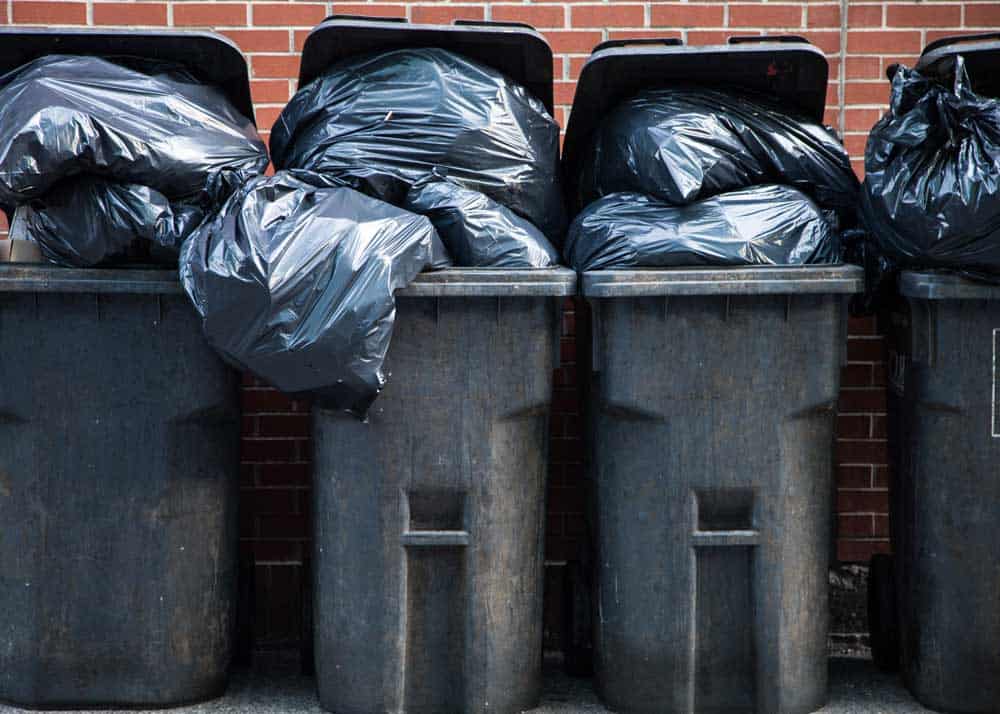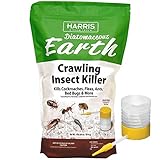If you’ve ever opened your trash can and let out an undignified shriek at the white, wriggly bugs inside, you aren’t alone. Flies love to breed in disgusting places, and that often results in unsuspecting homeowners finding maggots in their trash cans. Here’s how to kill magoots in the trash can.
There are many ways to kill maggots in your trash can, including vinegar, bleach, salt, boiling water, and insecticides. Getting maggots in your trash bin can happen to anyone. These methods will reduce, even eliminate, the maggots and resulting flies from your trash can.

Table of Contents
1. Boiling Water
Boiling water is one of the quickest and easiest ways to kill maggots. It happens almost instantly.
Maggots are fly larvae with soft, underdeveloped bodies, so they have no defense against boiling.
There are a few drawbacks to this method, however:
- Plastic melts at anywhere from 200°F – 350°F, so if your boiling water is hotter than that, it can warp your trash can.
- You’ll have a soggy mess of dead maggots in your trash can. You’ll probably want to hose the whole thing afterwards.
- If any maggots escape the boiling, they’ll grow up, lay more eggs, and start the whole process again.
2. Freezing
Similar to the above, maggots can’t handle the cold any more than they can handle the heat. You can kill them by exposing them to extreme temperatures.
If you live in a wintery climate, this can be as simple as leaving your trash cans outside overnight.
Another method for warmer climates is gathering the maggots in a container and putting them in a freezer.
This is a more hands-on option than some folks might be comfortable with, but it can be effective for people who are squeamish about boiling them alive. It’s a more humane method.
3. Vinegar
Vinegar is a natural insecticide that also doubles as a cleaner and deodorizer. You can combine one cup of vinegar with two cups of water to create a powerful, yet all-natural maggot killer.
There are two ways to use vinegar effectively.
- The first is with a spray bottle for direct, targeted attacks on maggot piles; your vinegar solution will soak them and kill them.
- The second method is using a sponge or compress to clean your trash can. This is more of a preventative measure than an extermination technique, but it can still get results. The flies won’t want to land on your trash and breed there.
For maximum efficiency, use both vinegar methods.
4. Bleach
Humans aren’t the only ones who hate the smell of bleach! For maggots, however, it isn’t just a matter of wrinkling their nose; the poisonous fumes of bleach can kill them in as little as 30 minutes.
To use bleach against maggots, start by diluting it with an equal amount of water. Then spray your solution into your garbage can, liberally coating both your trash and the trash container itself. Close the lid and let it sit for 30 – 60 minutes.
Some maggots might survive the fumes, so to be thorough, repeat the process once or twice.
5. Diatomaceous Earth
If you aren’t a fan of chemicals, consider using diatomaceous earth to kill the maggots in your trash.
It’s an all-natural substance made from microscopic sea life, and while it looks like a powder to human eyes, it’s actually quite jagged on a molecular level. It will act like razor wire to soft and pulpy larvae.
Harris makes this 4lb bag and comes highly rated.
Another benefit of diatomaceous earth is that it works on more than just maggots.
So if you have an ant, spider, or flea problem, this can be an all-in-one solution for home and garden pests.
6. Insecticides
Many over-the-counter products can kill maggots, including bug sprays, animal shampoos, flea and tick treatments, and even household cleaning products.
The ingredient to look for is called permethrin. It’s deadly to all kinds of bugs, so it’s quite common in insecticides.
Sawyer makes a permethrin spray for products (like clothing and tents). You might consider spraying the inside and opening of your trash cans.
Another ingredient to know is called pyrethrum. (Note the similar spelling!)
It’s used to treat things like head lice, and it works by killing eggs, larvae, and adult insects in one go. Pyrethrum is an insecticide made from dried pyrethrum flowers.
7. Salt
Last but not least, salt can be used to kill maggots.
Maggots thrive in damp and moist places, and salt can dry out both their bodies and their surrounding environments. It’s also quick, safe, non-toxic, and easy to grab from your counter.
In addition to putting it inside the trash can, you can also add it to the rim.
The benefit of salt is that it is natural and won’t harm your family or pets. Salt is a safe method for killing maggots.

A great way to prevent maggots is to repel flies. Here are 17 smells that flies hate.
Maggots in Trash Can FAQ
Will garbage men take garbage with maggots?
Maggots aren’t usually a problem for garbage men.
They don’t look inside of your bins or even know that the maggots are there. There shouldn’t be any issues with them taking your trash.
Will bleach kill maggots?
Yes. Bleach can be used to kill maggots through both direct bodily contact and through the indirect inhalation of its fumes.
For the best results, follow this routine:
- Mix together a 1:2 ratio of bleach and water.
- Spray the mixture into your garbage can and close the lid.
- Wait 30 – 60 minutes for the maggots to die.
- Repeat the process as necessary.
What kills maggots instantly?
Maggots can be killed quickly and easily with boiling water. They’re larvae, so their bodies are soft and pulpy without any protection against the scalding temperature.
However, it should be noted that boiling water can cause just as many problems as it solves.
For example, extremely hot water might melt or warp the plastic of your trash can, or it might stick your garbage to the interior walls.
You’ll also have a clean-up job to do with all of the dead maggots in your bin!
Will Lysol kill maggots?
No. While some household cleaning agents can kill maggots, Lysol isn’t one of them.
The ingredient that you’re looking for is permethrin, a deadly insecticide, and it can be found in other brand names like Nix, Repel, and Off.
Of course, some might die from Lysol, but this isn’t it’s purpose. And it isn’t effective.
Why are there maggots in my trash?
Maggots are the larvae of flies, and flies are attracted to garbage as both food sources and breeding grounds. They can eat, lay eggs, and provide sustenance for their larvae all at once.
Trash cans with lids are particularly attractive to maggots since they need dark, damp places to survive.
Are maggots a sign of poor hygiene or sanitation?
A maggot infestation can happen to anyone. It has nothing to do with cleanliness; it’s simply a matter of where flies decide to lay their eggs.
They’re very opportunistic creatures, and they can be hard to get rid of once they’ve found feeding or breeding grounds that they like.
How do I prevent maggots in my trash can?
While there’s no surefire way to prevent flies from breeding in your trash, there are several methods that you can use to discourage them.
- Use a container with a tight lid to prevent flies from smelling or reaching your garbage.
- Keep all of your garbage in tightly-tied bags. Never throw garbage directly into your bin, especially if it’s a food product.
- Regularly spray or hose your garbage can with a 1:2 mix of vinegar and water. Make sure to dry it thoroughly before you add any liners or bags of trash.
- Sprinkle a little diatomaceous earth over your trash bags.
Keep reading: Lots of crickets? Here’s how to catch a cricket.

Here’s how to get rid of spiders around the house.
Fixing the Maggots in Trash Can
No one likes having maggots in their trash, but the good news is that you don’t have to live with this problem. You can prevent it and solve it by utilizing the right tips and tricks for preventing maggot infestations. Good luck!
- About the Author
- Latest Posts
Bryan Haines is a co-founder and writer at The Buginator. And is working to make it the best resource for taking back the outdoors from biting, stinging pests.
He also blogs about travel at Storyteller.Travel and photography at Storyteller Tech. Bryan is a partner at Storyteller Media, a publishing company he runs with his wife, Dena.


